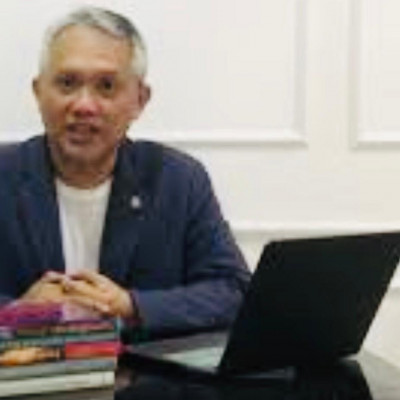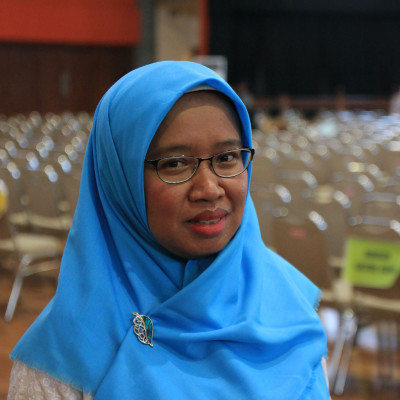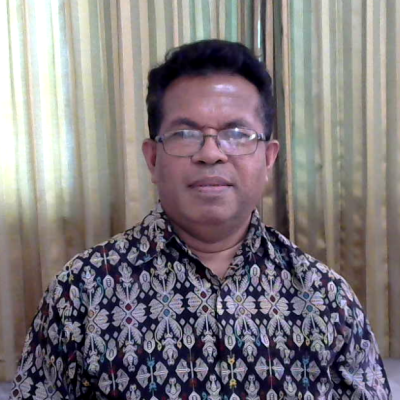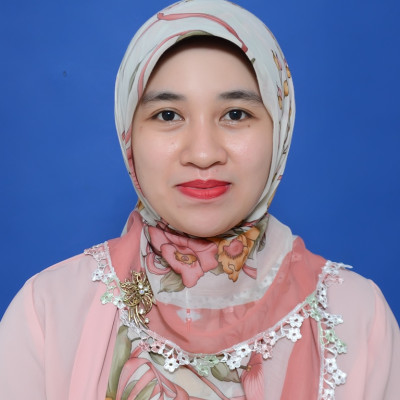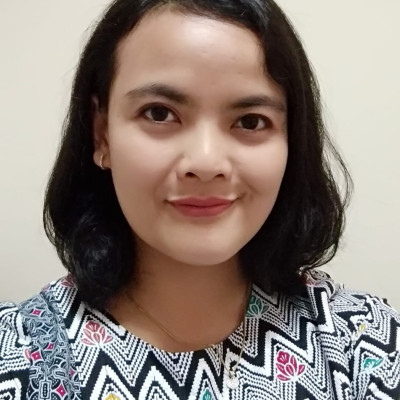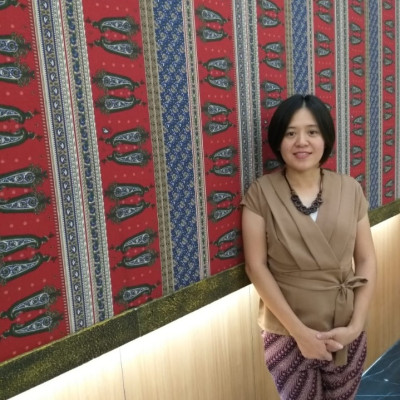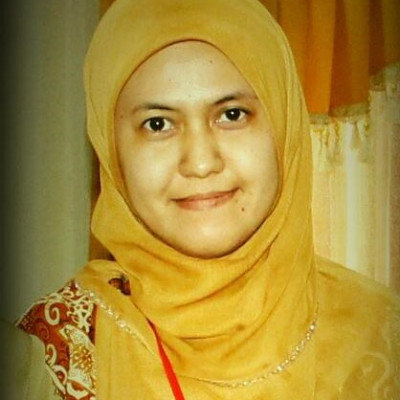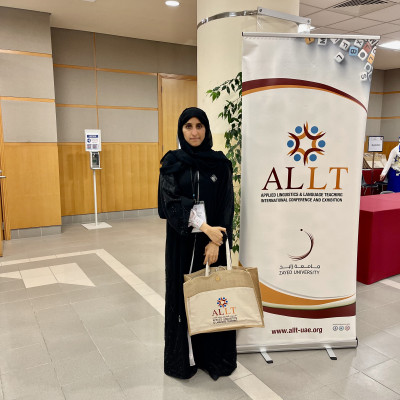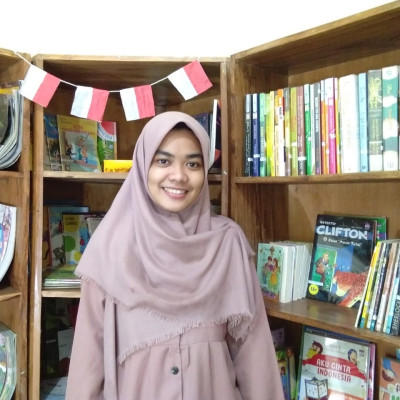Sessions / Presentation
A presentation
Embracing pleasure reading: kickstarting post-COVID-19 literacy recovery #3716
It is rare to hear a conversation about COVID-19 that does not include the phrase "unprecedented event.” However, by examining past disasters—specifically, ones affecting young learners—we may establish a precedent for recovery. In August 2005, the Caribbean and gulf coast regions were hammered by Hurricane Katrina. Over one million people were displaced, and thousands of children had their education interrupted during critical early learning and development stages. The educational interruptions and recovery process led to students falling behind their unaffected peers by as much as a year. COVID-19 is already showing similar impacts on student development, especially language acquisition, development, and reading. Nevertheless, a multi-faceted, extensive reading program that incorporates support for classrooms, homes, and special reading events can combat the widening literacy gap exacerbated by the years of pandemic lockdowns and slow recovery.
A longitudinal motivation study based on intercollegiate ER circle activities #3729
This presentation will describe a framework for a longitudinal L2 motivation study based on a three-year voluntary ER circle project co-hosted by four private universities in Japan. Drawing on Dörnyei’s complex systems theory, we have employed a mixed approach that integrates both quantitative and qualitative analyses of learners’ motivational changes over the long term. We will make an interim report of our analyses and discuss challenges ahead both in terms of educational practice and research design. So far, a quantitative analysis of periodical questionnaires shows an increase in the comfort level of the participants while a decrease in the anxiety level. However, the descriptive statistics of the reading data show an overall decline in reading amount, which indicates difficulties in maintaining long-term motivation. Individual-based qualitative analyses of questionnaire surveys as well as personal interviews are employed to identify the motivational and demotivational factors.
Beyond engagement: Multimodal responses to students' reading experiences #3803
Studies found that multimodal texts are more attractive to students and have been helpful in engaging reluctant readers (Serafini, 2012; Thompson & McIlnay, 2019). For regular texts to receive similar reactions from less engaged readers, multimodal responses as during- or post-reading activities may need to be introduced. This presentation reports the experience of a group of English department students in adapting some self-made reading materials like poems and short stories produced by other students into other modes such as short movies, audiobooks, and video books. The adaptation process took place in four months under a project called EDAP ( English Department Adaptation Project). Data was collected using ethnographic data collection methods such as observation, in-depth interviews, and students' self-reflection on reading and adapting the texts. The multidimensionality of their experiences was reflected in the level of engagement and in the depth of their comprehension of the reading materials.
Teachers trainees' opinions about ER #3813
The participants in this study were fourth-year undergraduate students enrolled in the Teacher Education Program at a private university in Japan. For their seminar work, the students read articles describing the benefits of extensive reading (ER), the process of implementing an ER program and relevant research studies. After six weeks of lessons, the teacher trainees participated in an ER lesson as students. Data was collected through the use of a questionnaire containing open-ended questions. Each question represented a research question for this study. The questions elicited the teacher trainees’ opinions about: ER’s viability within the Japanese context and for low-level learners; perceived weaknesses and strengths of ER; possible approaches for incorporating ER into English classes; ER and student motivation; and whether they plan to use ER in the future. The results indicated the trainees had a positive view of ER, but they were mostly concerned with ER’s viability for low level learners.
How can ER teachers improve reluctant readers' reading skill? #3861
As an ER teacher, I often see poor readers in my reading classes. Some learn and develop their reading skills by way of reading multiple books, but it’s also common to spot slow or reluctant learners of English in ER class. Their reading level doesn't change over time or sometimes it seems regressive. Their typical reading trait is they do not bother to learn unknown words or phrases; they are just skimming through a book without adequately understanding it. Over many years of ER teaching experience, the presenter tried to find a solution to fix the problem. The presenter wants students to get over their reading hurdles, bringing back on the virtuous reading cycle. What the presenter found effective for those learners is dropping their reading level, by using Level Down Reading (LDR). Teachers arbitrarily lower the reading level of the student in trouble with reading. LDR is implemented if necessary at some intervals until the student reaches to the point where they can get over her reading hurdles. This presentation is based on the observation of young Korean learners of English who learn English through extensive and intensive reading. It tries to give some insight to ER teachers who have trouble with reluctant learners. It also demonstrates how LDR works with poor readers and makes them to be more confident and better readers.
Non-English major college students self-selected ER materials and practices #3863
Extant studies have demonstrated that college students generally perceive extensive reading positively, particularly those from English major. However, a little is known the perceptions and practices of non-English major college students after four months taking an extensive reading course. 86 colleges students with diverse disciplinary and cultural backgrounds participated in this study. They took extensive reading course as an elective subject in partial fulfilment for their bachelor's degree. They were asked to select a book based on their interest and recorded what they read, when, and amount of time spent for reading the book during four months. After implementing extensive reading for four months, the participants were asked to complete a questionnaire that looked at their choice of books, opinions and attitudes towards extensive reading, level of enjoyment, and their language learning growth based on their own judgement. We found that in terms of book selection, the participants selected books based on personal interests, cultural backgrounds, or academic requirements. The participants who viewed reading as a task or chore did not experience the same language acquisition benefits as those who viewed it as a pleasurable activity. The participants who found that reading was enjoyable, they were more likely to continue reading and spend more time engaged in the activity. This increased exposure to the language may lead to greater language acquisition. These findings are pivotal to further explain what works in conducting extensive reading for non-English major college students.
Comparing reading habits of 18-19 year-old urban students in Indonesia and Malaysia in 2023 #3666
Implementing a reading programme for college students has always been a challenge as getting students motivated to read requires consideration from many aspects. This collaborative project investigates the similarities and differences of the reading habit between 18-19 year old urban college students from intact classes in Indonesia and Malaysia. Two same multiple-choice questionnaires, one for Indonesia and the other for Malaysia, were created on google forms and sent to 30 college students in Indonesia and Malaysia respectively. The responses from the 13 questions in the questionnaire are used to compare the reading habit and motivating factors to read for these 60 students. The insight gained can assist course coordinators to organise, implement and monitor reading programmes more effectively.
Estimating text difficulty with machine learning #3681
Recent developments in AI chat are sending shockwaves through the language teaching community, both with short-term challenges of instructing students when and how to use this technology and as a longer-term existential threat to the teaching vocation. On the other hand, this same technology presents an opportunity for the automatic production of compelling input, not only in English but potentially for many other languages. Critical to providing suitable input is determining the level of readability, for example measured in YL (Yomiyasusa Level), which is based on impressions of difficulty by readers in Japan. This presentation reports on research into machine learning techniques used to estimate YL using the Coh-metrix analysis tool, Lasso linear regression and grid search cross-validation. The model predicted YL with a strong correlation of .91, significantly better than the Flesch Reading index. The results suggest that the developed model is a promising tool for predicting YL.
Literacy hERoes – Student involvement in a literacy program #3748
Studies show that Extensive Reading (ER) helps students to improve their reading skills, vocabulary, and understanding of other cultures. However, teachers have doubts about how to conduct ER programs and students might not be familiar with ER. Hence, collaborative learning in a form of mentoring both for teachers and students, Literacy hERoes is put forward to help introduce ER. This presentation showcases the activism of Literacy hERoes who joined in the IERA Goes to School (IGS) Program in 2022. They were actively involved in the program with the support of the IGS Program Team. Using data resulting from the reflection sheets and focus group discussion sessions, we will also discuss the merits and the lessons learned along with challenges they faced in this program. As a result, these LHs can take advantage of their involvement for their future learning.
Positive-themed storybook reading: a literacy and well-being booster #3820
The presentation explains the impact of using Positive Psychology -Themed Storybook (PP-TS) reading in the classroom. This exploratory study-based procedure aimed to test the feasibility of PP-TS reading, motivate children with level A reading ability (RA) to recognize the alphabet and target vocabulary words, progress on different developmental timelines, and enhance their well-being. Four different topics of PP-TS were selected: kindness, gratitude, compassion, and connectedness. Forty participants from the Share Love Charity English Class in Fukushima city joined in classes for six months. As a result, 70% of the participants improved their reading ability, and 90% of children showed positive attitudes such as being grateful for what they have and having a 'jolly' attitude. Results suggest that the promotion of parent-initiated training to assist children reading at home, and the promotion of other PP-Themed activities among younger learners are highly recommended.
Where can you find COVID, Ukraine, BTS and chatty mushrooms? #3678
In this talk, the presenters will discuss Xreading News. This is an exciting feature of Xreading launched in April 2022. Xreading News offers real news stories each week achieving two main goals; 1- to expose students to current affairs, and 2- to expose students to more English. Five news stories from around the world, from a wide range of fields, such as Science, Technology, the Environment, and World News, are produced in graded language and uploaded to Xreading every Sunday. But how do writers select their stories? Why are some stories more suitable for Xreading News than others? Why are Ukraine and chatty mushrooms suitable and Roe Vs Wade is not? The presenters will talk about their experiences choosing, writing, and leveling real news stories. We will also look at the changes made from an original submission to a published entry and discuss why the editing decisions were made.
Variables associated with reading rate gains: a data mining study #3682
Reports and arguments supporting positive effects of ER tend to highlight gains in reading speed, but the research base on how reading speed improves among L2 readers, both in general and among those that undergo ER activities, is still limited. This presentation reports on an explorative efforts to identify reader variables associated with reading speed gains among participants in an EFL reading course at a Japanese university (n=24). The two-semester course aimed to improve the students’ reading speed and other skills, and utilised an online ER platform, which recorded student access and activity logs and, among other things, produced reading speed estimates for each e-book they completed reading. Employing a data-mining approach, the presenter compared the students’ reading speeds at the outset and end of the course, and looked for variables linked to speed gains. Findings and their implications are shared at the presentation.
ER and TOEFL ITP scores #3711
This presentation will report on a study that extends an earlier pilot study on extensive reading and TOEFL ITP progress. The pilot study found only a small correlation between score achievement on the test and the amount of extensive reading and listening on an eight-month intervention. For the current study, reading, listening, and TOEFL ITP data for two cohorts in the same program (280 subjects in total) were considered. During the intervention, students in these cohorts were more strongly encouraged to make use of the audio (reading while listening), and they were occasionally asked to read non-fiction graded readers in preparation for in-class activities. The results of the current study will be discussed, along with how the program has attempted to find a better configuration of program elements to help students see greater scores on the TOEFL ITP, the largest institutional measurement tool of student English proficiency improvement.
ER practice in the public school #3736
All English teachers believe extensive reading can be very helpful for students. The big question is when and how. Ms. Wu, a public English teacher from Wuhan, China, who was inspired by presentations during ERWC5, started her practice with her G7 students in 2019. Despite big challenges including misunderstandings from the parents, lack of reading hours, no books, and no immediate effect, they kept practicing ER in the classroom during the 3-year pandemic period. In 2022, these students graduated with very positive test scores and most importantly, many students have formed a daily reading habit. The presentation will reveal the secret behind the story.
Developing Indonesian university student intercultural awareness through ER #3767
It is understood that extensive reading can be an effective way to expose students to texts that reflect cultural practices and perspectives. This presentation reports an experience using Xreading materials to teach western society and culture that integrated some components of extensive reading. Fifty-five sophomore students from the English Literature program at Universitas Negeri Surabaya were assigned to read a selection of fifteen graded readers that address various topics on Early American history and multiculturalism in America. The students were given the freedom to select the texts to read and were asked to comment on the readability of the texts based on vocabulary and familiarity with the topic. They were also encouraged to make connections with the texts through online forums. Student responses revealed that the selected texts were relatively at their reading level. The simple language and new vocabulary provided a challenge that did not hinder understanding and helped maintain students’ interest. Students’ familiarity with the topic was also addressed in that they could see the connection between the texts on American history. In addition, familiarity with British history also made it possible for students to build a connection to the texts on Early American history. The personal connection was also built through online forums where students responded to each other’s comments.
Effects of Pachinko literature circles on Korean EFL university students #3815
This presentation examines the effects of Literature Circles specifically constructed to analyse the English-language novel Pachinko. The LCs included in this study are made up of 24 senior year Korean university students majoring in science and engineering – a group traditionally considered less exposed to reading fictional literature, in comparison to their peers. The post-reading student-survey results showed that the reading experience, combined with the LC activities, improved the student’s ability to read and to discuss literature in English, the overall effect being that students observed increased confidence in their broader English usage. Results also showed that 80% of class students did not find Pachinko difficult to read. This suggests that Extensive Reading conducted without graded readers can be a success in the EFL classroom. Lastly, this presentation will recommend a number of English-language texts that are appropriate, in terms of both educational purposes and cultural content, for EFL students participating in ER streams.
West Sumba students’ reading motivation, difficulties and strategies #3858
In order to enrich students’ knowledge and collect important information, students need to have good reading skills. Good reading skills can be built and sharpened by having good reading motivation. Good reading motivation can be initiated by engaging students with reading materials. Motivation in reading can affect students’ reading comprehension, and without motivation, students may have poor reading comprehension. However, it is inevitable that students may face difficulties in their reading which may decrease their reading motivation. In rural areas in Indonesia, there are several obstacles which may affect students’ reading motivation such as lack of learning resources, inadequate facilities, language barriers, and unsupportive parents. Therefore, to maintain their motivation, students need to equip themselves with appropriate reading strategies. The objective of this study is to investigate the English reading motivation, difficulties, and strategies of West Sumba senior high school students. This study uses a descriptive quantitative approach with a survey. The items in the surveys were used to collect data regarding the students’ English reading motivation, difficulties, and strategies. The results of this study indicated varying levels of reading motivation for four different motivational variables, namely self-efficacy, intrinsic, extrinsic, and social issues. Common difficulties faced by students in their reading activities are their interest in watching television or playing with their gadgets rather than reading, problems with their parents, and lack of English reading sources. The strategies that students did to overcome these difficulties were limiting their screen time and asking their teacher to provide more time for them to read English materials in class.
Integrative-Post Reading Activities: A Reflective Study in Extensive Reading Class #3676
Extensive Reading has been a compulsory subject in the English Education Department of a private university, Indonesia. Following pleasure reading activities, integrative-post reading activities, recreating a new script from graded readers adaptation and performing mini drama, were implemented. The present study aims to portray the practices from the teachers and students’ point of view. Ninety six of first-year students participated in this study. The instruments were teacher’s field note and questionnaire. The collected data were then analyzed thematically. This study reveals that most students perceived positively towards the integrative-post reading activities. It facilitated them to collaborate in groups and enhanced their integrated skills, which are writing and speaking, as well. Similarly, the teacher noted that it was challenging but at the same time boosting their confidence and competence. The implication of this study is for providing a sustained integrative post reading activities in ER class for a comprehensive ER practice.
Setting up and maintaining an ER program for first-year university students #3727
The benefits of ER are now well established (Nation & Waring, 2020) and language courses which include an ER program developed with a principled approach can provide learners with quality opportunities to improve their language proficiency (Nation & Macalister, 2021). When the Foreign Language Division at a women’s university in Japan was established in 2018, its staff envisioned utilizing ER to provide its students with quality opportunities to improve their language proficiency. This presentation reports on how an ER program, now in its fifth year, was set up and maintained for 700+ first-year students in a university-wide compulsory English course. It describes how the ER program started with printed graded readers in 2019 and transitioned to digital graded readers with Xreading in 2020. It details how the program is managed, how it navigated the challenges of the Covid-19 pandemic, students’ achievements, and students, teachers and administrators’ perceptions of the program.
Correlation of reading speed, engagement, and comprehension in online ER #3759
Students should read comfortably and at an adequate speed when doing ER. Reading duration, time-on-task, and effort are measures of reading engagement promoting reading comprehension. In the digital era, ER has shifted to online platforms. This study investigated the relationships between the reading speed, engagement, and reading comprehension of 34 Thai university students using XReading for six weeks. The time spent and number of activities were also collected using separate record forms. A Likert-scale questionnaire assessed the participants’ reading engagement. A Pearson r correlation revealed positive relationships between comprehension and indicators of reading engagement; namely, time-on-task (r = 0.62, p = 0.00), and reading engagement (r= 0.80, p=0.00) and reported no correlation for reading speed (r = -0.06, p = 0.77) and the numbers of activities (r = 0.08, p = 0.66). The implications for online ER practices and their limitations will be discussed.
Building an ER booklist to meet different needs of Chinese students #3812
There are two major kinds of paths to learn English in China: acquisition and learning for exams. The students who learn English through acquisition normally start before they are three years old and follow similar paths with US kids, using leveled readers, bedtime stories, and songs. By the age of eight, many of them are able to read authentic teenage-level books, but it doesn't necessarily mean they can get a high score on English exams at school. So, we might ask what should they do? Other students follow the school textbook system and can pass the exams, but they can't read the books, and don't enjoy reading. Thus, we might wonder if there are any materials for them to start reading. From beginners to higher intermediate levels, we divide the reading level into 5 stages based on headwords level of the ERF form. This presentation will give some suggestions about books for each stage for these two kinds of students.
Scholars speak out: Voices from the field (International) #3875
To promote the “extensive reading approach” worldwide, the Extensive Reading Foundation (ERF) invites teachers and scholars to apply for a scholarship in order to take part in the ERWC for their own professional development and for the future promotion of Extensive Reading in their home countries. This session features individual presentations by the 3 scholarship recipients from outside of Indonesia with an overview of the issues and challenges faced in their contexts followed by their plans for carrying forward in implementing & growing extensive reading.
The potential of XReading to boost student’s passion of reading: a case study of an avid reader #3680
This case study explores the affordances of a digital reading platform, XReading, in helping Jasmine excel in reading. Jasmine is a freshman at a state university in Malang. The department where she studies, offered Extensive Reading (ER) course as a compulsory part of the curriculum in the first semester. During the 16-week ER course, Jasmine read more than 1,000,000,- words from the website. The initial target for the 2022 cohorts was 120,000 words in a semester. Thus, it is important to understand why Jasmine read more than the expected target words and what had her kept going. A semi-structured interview was done with Jasmine after the class ended. The findings of the present study help teachers of Extensive Reading (ER) programs to shape their classes in such a way that encourage learner autonomy. This presentation also shows how reading in an electronic age affects students’ motivation in a positive manner.
An exploration of Indonesian EFL students’ flow and extensive reading #3689
This research project investigated the students’ flow experience (FE) when reading extensively and conditions that enabled their FE. The participants were 36 Indonesian university students who studied at an English department and enrolled in two reading classes. They read extensively and individually chose books which were available in X-Reading. The data of this study were collected by distributing surveys and observing students’ ER. The findings showed that when reading extensively, the students did experience flow and it happened mostly due to their interest in their reading material. In general, the students read more in the second semester than in the first semester. Although students read more words in the second semester, the correlation between FE and the sum of words that the students read was weak. The goal condition of FE was also found as the lowest variable in both semesters. The findings indicated the importance of guiding students to set their weekly goal and motivate their ER practice to facilitate opportunities for FE and increase the quality of their language learning.
Indonesian teachers' attitudes towards extensive and intensive reading #3766
It is no doubt that extensive reading (ER) and intensive reading (IR) are powerful teaching approaches that can help students develop a love of reading and overall language skills. This presentation aims to investigate teachers’ attitudes towards ER and IR through a nation-wide survey that involved 2,111 junior high school teachers of language and non-language subjects. The survey was conducted online and taken prior to a series of three-day workshops on ER and IR sponsored by the Indonesian Ministry of Education, Culture, Research, and Technology. Each workshop was attended by approximately 120 teachers from different regions across Indonesia. In general, the survey results revealed that teachers demonstrated positive attitudes towards ER and IR. Moreover, a remarkably high percentage of teachers (86.8 %) believed that teaching reading was not only the responsibility of language teachers. On the other hand, only a small percentage of the respondents (1.9 %) admitted that they were knowledgeable about reading comprehension strategies, let alone teaching them to students due to inadequate training and resources. In addition, most participants (68.8%) expressed a need for professional development on how to teach reading and writing related to their subjects. The study implied that continuous training on integrating ER and IR across curriculum should be carried out.
Four-year investigation of extensive reading with restriction #3806
In terms of implementing extensive reading (ER), instructors often let students choose what they want to read. Thus, instructors do not exercise any control over the difficulty level of students’ reading materials. The present study is a four-year investigation of ER with restriction, which attempts to address this issue by setting restrictions on students’ choice of reading materials. 206 third-year Japanese university students participated in this study. The first group (free-reading group) was permitted to read books of any length, whereas the second group (restricted-reading group) had to choose books of at least 1,000 words in length. The findings revealed that both groups read a similar number of books over the same period of time. However, the restricted-reading group read more words than the free-reading group because the restricted-reading group had to choose books of at least 1,000 words in length. Requiring students to read longer books might encourage them to read more and thus reach their reading goal more easily.
How a class library optimizes the regular class in a junior high school #3809
This presentation focuses on how a mini class library with about one thousand books was set up and managed. Additionally, the benefits for classroom activities and homework will be discussed. Around thirty five students from grade 7 read extensively for two years and improvements on student motivation, stamina, and grades were recorded through interviesw, surveys, reading logs , school work, and test papers. The audience will learn how to develop student interest and efficiency in learning English through wide reading in a public junior high school in Shanghai, China.
Scholars speak out: Voices from the field (Indonesia) #3876
To promote the “extensive reading approach” worldwide, the Extensive Reading Foundation (ERF) invites teachers and scholars to apply for a scholarship in order to take part in the ERWC for their own professional development and for the future promotion of Extensive Reading in their home countries. This session features an overview of extensive reading and the common issues and challenges in the Indonesian context followed by individual presentations by the 4 scholarship recipients on their plans for carrying forward in implementing & growing extensive reading.
Japanese university students’ attitudes towards extensive reading online #3712
Extensive reading (ER) has been well-documented as a robust tool for developing EFL students’ L2 skills. For a large portion of its existence, ER research and approaches have relied heavily on paper-based materials. However, appropriate paper-based graded readers for students are often limited at Japanese universities. Thus, this research project aimed at supplying 50 Japanese EFL students with access to a digital library, allowing them to use any device for reading eBooks that aligned with their reading interests and abilities. Through a mixed-methods approach, the participants of this study were surveyed about their attitudes toward graded readers via an online extensive reading digital library utilizing a modified version of Yamashita’s (2007) Reading Attitudes Survey and an open-ended questionnaire in order to get a better understanding of how cognitive, affective, and behavioral factors play a role in extensive reading mediated by technology.
Using ER, read-aloud, and speed reading in active learning EFL classrooms #3749
This presentation shows examples of how extensive reading is integrated into course designs that focus on the active skills of speaking and writing. The practices showcased have been applied in college English skills classrooms in Japan and also in elementary school classrooms, sometimes with college student-instructors in a Service-Learning class design. The ER component comes from the use of level-appropriate vocabulary and the large amount of class time devoted to reading without much deliberate language teaching. We argue that extensive reading using XReading, read-aloud, and speed reading, combined with vocabulary and linked skills activities can be effective in active learning classrooms and in increasing learner confidence, motivation, and comprehension. In the college setting, success was measured by semester word count and self-reported goal achievement. In the elementary school class, schema building, pre-teaching vocabulary, an engaging worksheet, and activities sustained reading time over a large part of the session.
Developing bilingual digital reading material with local context theme #3779
This presentation focuses on the current findings of an ongoing case study conducted with an in-service teacher in East Kalimantan, Indonesia, concerning the challenges of developing bilingual digital reading materials with a local context theme for young learners. This study closely observed a teacher as she went through intensive training for developing digital reading materials. Afterward, a series of in-depth interviews were conducted to investigate the difficulties encountered by the teacher during the materials development process. The findings revealed that the teacher found it difficult to choose a digital platform that was simple to use while also providing adequate interactivity to facilitate the intended reading activities. The other difficulty was finding a topic that was both interesting and relevant to the curriculum in the local context. These findings highlight the importance of proper training in the development of digital reading materials and how to use them in ER contexts.
Virtual library experiences, interests, and preferences: What we learned #3797
Extensive Reading (ER) is considered one of the more effective ways to develop reading skills among students as they are exposed to large amounts of meaningful input that is selected by them. The purpose of this study was to investigate students' learning experience, interest, and preference relating to the implementation of a virtual library (VL) within an academic English program. The implementation of the VL was primarily to promote and monitor the ER habits of students. The study involved first-year (N = 137) female students from a university in Japan with an average CEFR scale range of B1 – B2. Participants completed an online survey in the final quarter of the 2022 academic year after actively using the VL for a period of two quarters (14 weeks). The implications of this study’s preliminary findings and the related dynamics regarding the implementation of a VL, more specifically X-Reading (www.xreading.com) will be discussed.
Nation's Four Strands approach to support ER and EL implementation #3880
The "Four Strands" approach maintains that we need to provide our students with more time to practice through meaning-focused input (Reading & Listening) and output (Speaking and Writing) as well as "fluency training" by having them read, write, speak and hear material that they already understand. It states that 75% of student learning should be devoted to practice with only 25% of the time spent on frontal teaching or studying grammar or vocabulary. This session will discuss what this means in practical terms bringing recent research to support Nation’s contention.
Reading out loud: Aid or interference to reading comprehension? #3756
Are the benefits of reading out loud in a second language exaggerated or misplaced? Students with a strong background in having books read to them out loud may demonstrate good English pronunciation and smooth reading when they themselves read out loud. Good pronunciation and/or smooth reading when reading out loud, however, does not appear necessarily reflect the readers comprehension of the text. Indeed, it would appear that a student’s pronunciation and/or smoothness in reading out loud should be used as an ancillary means of measuring a student's ability to understand the meaning of a text. The presentation will discuss a series of pedagogical experiences and research-based conclusions that have challenged his previously misguided assumptions in this regard, and which have led to his recently modified approach to reading out loud in L2.
Implementing ER for vocational high school students through literacy cloud #3773
Literacy Cloud is a free digital storybook that can be used by teachers to engage learners in developing skills and habits of reading. This presentation examines the implementation of extensive reading (ER) using Literacy Cloud as mobile English learning and their perceptions of this implementation. Forty-five EFL students in 3rd-grade vocational high schools participated in this study. They had no experience in ER and did not have experience using Literacy Cloud before, so Literacy Cloud was introduced to support the ER program. Then, questionnaires and interviews were given to find out their experiences using Literacy Cloud in the ER class. The results showed that they have positive attitudes and perceptions about Literacy Cloud, and they revealed that it was very useful for supporting their English skills, especially reading skills. This study suggests that English teachers should consider ER to be implemented in language learning, it is advisable to integrate it with technologies such as Literacy Cloud because it provides many benefits for the development of students' reading skills.
Combining ER and distant reading using literary texts with computer coding #3793
With the development of Gutenberg's printing technology, the number of publications increased in large numbers, and the purpose of reading and the way of reading diversified. Then, with the advent and development of digital technology such as computers, not only paper books but also digital books have increased. In the meantime, the way of reading has become more diverse. Among several reading methods, extensive reading (ER) is still a useful method, but in some cases, it needs to be used properly with other reading methods in the era of big data. Among other types of reading, there is distant reading (DR). DR is a term coined by Franco Moretti, an Italian literary scholar, to describe a methodology of literary analysis that involves the quantitative analysis of large amounts of literary texts. In this presentation, we would like to introduce a teaching method that can properly combine ER and DR for literary texts. For DR, beginner-level computer coding activities are covered in this presentation. The programming language for DR is R. R is well-liked and widely used among professionals who work with data, particularly those who specialize in data science. In this presentation, we also introduce a checklist and materials for the ER-DR classes.
Students' reading preferences and reflections: From pleasure to meaningful #3802
Learning reading is sometimes a scourge for students from Gen-Z, especially in the post-covid-19 situation where the learning process is still limited. This presentation examines students' preferences and reflections on reading courses. A survey-questionnaire and interviews were conducted using a sequential explanatory design. 99 respondents Indonesian students participated in this study. This study revealed five findings regarding students' preferences toward their reading activities which cover reading book genres and resources that they prefer. Moreover, reflections covering students' reading awareness and their expectations of reading courses are elaborated in this presentation. This study's findings offer recommendations for teachers in organizing reading courses, demonstrating that learning to read entails not only theoretically learning several reading strategies, but also practicing them to improve their ability to fully understand the context of reading pleasantly and realizing that learning reading is more than just reading and answering reading questions.
Reading circles for improving advanced (B2/C1 CEFR) conversation skills #3814
Although many textbooks to practice conversation are available on the market, many that are based on themes may not appeal to, or may not be suitable to students in different cultural contexts. Reading Circles, an activity in which learners read a story and then discuss it according to clearly defined roles, can be an alternative to develop higher-level conversational skills such as expressing an opinion, agreeing or disagreeing, and summarizing a text. A Reading Circle can be based on any text, but graded readers are easy to use and control for level of difficulty. This presentation covers selection of stories, roles in a Reading Circle, how to conduct them, and shares student feedback from a class of advanced learners at a public university in Japan.
Capturing EFL Students’ Engagement in Reading Self-selected Books #3686
Students’ engagement in reading combines students’ motivation, effort, emotion, and ability to gain flow in reading. It is the key to help students love reading and gain their students' academic achievement. This qualitative study aims to identify the types of engagement that the students experienced in extensive reading and factors that make students engaged in reading English materials in a EFL context. This study was held in English Department at one of universities in Yogyakarta, Indonesia. As data collection techniques, reflection and interview were conducted to six students who enrolled a class that was implemented extensive reading. The students’ reflective essays were used as the main data to explore engagement that the students experienced in reading. In order to further the exploration, important statements appearing in the essay were confirmed and explained by the students through one on one interview. From the data, it was revealed that students experienced behavioural and emotional engagement when reading English books. Behavioural engagement was shown from students’ attempts to make time to read and finish their chosen books while the emotional engagement was identified from students’ positive feeling in reading that they wrote in the reflective essay. Furthermore, factors that made students more engaged in reading their books are their motivation, relevant reading materials, and influences from peers and teachers. Pedagogical implications and limitations are also discussed.
Adoption of online extensive reading to facilitate rapid reading class #3752
Reading skills textbooks are often inadequate in catering to the needs for students with various reading ability levels, content-related suitability, the and aims of the course. This research context involves 3rd year Japanese university English majors undertaking a 15 week Rapid Reading course. In order to address the related issues and course goals, an online reading system using the Xreading website was implemented as the core reading material, and included supplementary activities. Course evaluation was conducted by administering a Likert scale questionnaire and indicated positive results in terms of reading skills, vocabulary, satisfaction of reading materials in terms of genre, reading level and speed, and advantages in using features of the website. The presenter aims to highlight key features of the course, evaluation methods, questionnaire results, suitability, and practicality of the Xreading website from both the student’s and teacher’s perspective.
Flow experience in ER instruction for Japanese learners of English #3776
Studies (Kirchhoff, 2013; Arai, 2022) show that English learners experience "flow" (Csiksentmihalyi, 1990) during extensive reading (ER), but positive effects on performance have not been confirmed. This study addressed three questions: (1) whether learners experience flow in in-class ER, (2), whether learners who do engage in more out-of-class reading than those who do not, and (3) how reading attitude (RA) (Yamashita, 2007) of learners who do differs from those who do not. Of the 31 participants in this study, eight experienced flow, and the average number of words and time spent on out-of-class ER was higher for them compared to those who did not. Additionally, those who experienced flow had higher average values for several components of RA. Further research is needed to determine whether experiencing flow during in-class ER enhances out-of-class ER performance. Additionally, more investigation is required to identify the components of RA that facilitate flow in ER.
The multidimensional effects of extensive listening on EFL learners #3798
This study investigated the multidimensional effects of extensive listening (EL) on learners’ language gains, selection of study materials, practice styles, and their perceived effectiveness of EL. Fifty-five university students took part in a four-month EL experiment. Each week students kept a listening log recording what materials they selected, how they practiced, and how much time they practiced. Students also reported the content they practiced to their instructor at the weekly meeting. Language gains were measured through a pre-test and a post-test on students’ aural vocabulary test (Listening Vocabulary Levels Test, LVLT) and general listening comprehension (TOEIC). The perceived effectiveness of EL was collected through a 32-item questionnaire. Overall, students made significant improvements on their aural vocabulary knowledge and listening comprehension, which were consistent with their perceived effectiveness of EL. The questionnaire results revealed that most students liked and were able to select their study materials that suited their language levels and interests. In addition, EL was found to be a very individual activity because many students were reluctant to share or discuss with their friends about what they had practiced. Their practice style was mainly a combination listening plus viewing. Some issues encountered in the implementation of EL were discussed and suggestions were made.
Interaction pattern and questioning practice of the reading facilitators in group literacy sessions #3817
The success of a group literacy program relies on at least three main factors, namely the design of the program, method of implementation, and reading facilitators. Though these factors are interconnected and complementary to one another, reading facilitators play an elemental role in facilitating the interactions to allow participants moving between stages of reading. Furthermore, they provide adequate linguistic support to the participants in grasping the meaning of the text and relating it to the context. This presentation illustrates the practice of a group of reading facilitators (RFs) who are part of a literacy initiative called Baca Asyik di Rumah Aja. It focuses on the RFs’ interaction pattern and questioning technique used in facilitating the interaction with the participants. The result indicates that the interaction patterns tend to be non-triadic. Besides, the RFs utilize question types in combination to serve different interaction purposes and at different stages of reading.
Implementing ER program in the curriculum for younger learners #3822
It is generally acknowledged that extensive reading contributes more to the acquisition of language competence than classroom learning, especially for younger learners aged from 3 to 16. Most language schools which are still struggling through only classroom learning turned out to be unavailing. Thus the presenter started their trials of integrating ER program with IR course and helped the students to achieve more. In this presentation, the presenter would like to share their experience of how they integrated ER to the curriculum, including how to do the diagnostic tests and periodical assessments for the students; how to choose the proper ELL or ESL readers for them accordingly; how to setup the targeted skills and strategies for both IR & ER course; how to guide the in-classroom ER course and lead the at-home ER practices, and how students benefit from Extensive Reading.
How to motivate students with the help of a reading marathon #3872
Reading is one of the skills that is challenging to develop in the language classroom. In the classroom, there are not enough materials to choose from, and not enough goals or reading data to make students see their progress. In the face of these challenges, teachers are usually at a loss to develop students reading skills in and out of the classroom setting. To find the perfect reading goal for every student in a mixed-level classroom setting, the teacher must find a library with a variety of reading materials and data-driven goals for students. A perfect example is Xreading Virtual library and a reading marathon. Each student needs to have a clear number of words or books to read in a set period of time (3-4 weeks) and the reporting system helps them to see their reading level and progress. Each week the book reading progress is reported to the whole class so that students can see not only their personal goal but also their peers' goals. By simply reporting each week, students start getting more reading done in a short amount of time. At the end of each reading marathon, students and teachers give awards to the students with most progress in their reading.
A story of two classes: Adapting the new ER textbook Links for ‘retakers’ #3671
"Links" is a new four skills textbook with a built-in ER component through Xreading. This presentation compares the experience of students and teacher in the implementation of Links in two classroom settings: An intact class of mainstream students and a class of so-called ‘retaker’ students who have failed the course at least once before. Classes of retakers often require special considerations because of their previous negative learning experiences in English classes in particular and or anxieties in educational settings in general. Thus, retaker and mainstream classes will be compared qualitatively on affective and motivational measures, such as willingness to complete extensive reading and attitudes toward extensive reading, as well as quantitatively on performance measures, such as amount of reading and reading speed. Finally, I will present observations, successes, and challenges of adapting Links to each of the classes from an instructor’s perspective.
How do three modes of extensive reading affect learner vocabulary size and reading rate? #3709
Previous Extensive Reading (ER) studies almost exclusively focus on English language learners and tend to be limited by their lack of control over how the ER treatment is conducted and assessed. Furthermore, studies that investigate the possible effects of different styles of ER, including Extensive Listening (EL) and Audio-assisted Extensive Reading (AER), are few. The goal of this study was to investigate the possible effects of monitored ER, EL, and AER on the vocabulary acquisition, reading rate, and comprehension of learners of Japanese as a foreign language (JFL). Using an experimental design, data collection for the second year of this three-year project (currently including data from 150 elementary and intermediate JFL learners) has been completed. Current data indicate mixed results from these three modes of ER. Pedagogical implications and future directions will be discussed.
How to cultivate learners’ autonomy and creativity in Japanese ER courses #3784
The presenter has been conducting standalone Japanese ER courses in a U.S. university for the past nine years. In addition to in-class individual reading activities and book chats, the presenter incorporates semester-final projects in order to connect input to output. The projects and presentations also provide opportunities for learners to share their outcomes with their classmates. As ER itself is learner-initiated, the instructor tries to let learners control their own learning, including project presentations; therefore, topics and formats are completely free. Learners have created variety of unique products, including picture books, online games, and songs, to name a few. Many of the works reflect sentence patterns and writing styles that learners have naturally acquired through their individual reading. The presenter will showcase students’ products and examine how their ER experience influenced their works. Furthermore, the instructor’s role in cultivating creativity and autonomy will be discussed.
The Big ER Quiz #3847
This session will be a fun quiz to test your knowledge about extensive reading, graded readers, people and so on surrounding our world. It will be conducted via Kahoot.
Superhero comic books supporting language, literacy and environmental goals #3878
BASAbali supports local Indonesian languages, cultures and civic engagement by encouraging people to publicly discuss key issues using local languages on community-developed online platforms. In relation to reading, the Superhero series is modeled after traditional Indonesian shadow puppet storytellers and co-developed with the community and local artists. Digital superhero Luh Ayu Manik Mas engages youth to take action to advance sustainable development goals. The books offer language literacy, environmental and cultural literacy to children in an enjoyable way. This presentation will introduce the organization and its various activities, focusing on those that aim to promote language, environmental and cultural literacy. She will discuss the development of the superhero series, its successes and future plans. All ERWC6 participants will receive a copy of one comic book when they pick up their nametags on site.
Integrated dictionary usage during online extensive reading #3770
Reading strategies, particularly the ability to guess meaning from context, are valuable tools for developing vocabulary knowledge. The current research project, supported by a Japanese federal grant, is investigating how access to an integrated dictionary during ER affects learners’ usage of these reading strategies. First-year English majors use the ER application Xreading which now offers instructors the option of allowing learners to access glossary definitions while they read. At the start of the year, learners completed a survey of how often they use particular reading strategies. Using contextual clues and guessing meaning were among the strategies learners used most regularly. Pre- and post-tests were also given to determine how accurately they were able to guess meaning. Interestingly, results indicated that the experimental groups with access to the integrated dictionary showed greater gains in this ability. Later stages of this research will include replication, the addition of follow-up interviews, and the inclusion of non-English majors.
A change in learner’s views on EFL learning based on ER activities #3775
Extensive reading (ER) is promoted in the first-year university EFL communication course by integrating ER interactional activities while adopting an English for Specific Purposes (ESP) textbook. ER is activated in class through three ER interactive activities: (1 ) doing the sustained silent reading (SSR) with graded readers, (2) using a "learners' newsletter," a compilation of class affective states showing communicative success and challenges in ER speaking activities, and (3) doing "timed writing" to prepare learners mentally for the ER interactive task. The weekly logs and final interview revealed that interactive engagement increased when ER interactive communication activities were implemented consistently and supplemented with interactional strategies as scaffolders. Similarly, the language learning strategy shifted from translating to using simple words and gestures, thus changing views on learning English communicatively. This presentation discusses classroom practices of integrating ER interactive activities based on graded readers in the EFL communication course.
Utilizing Let’s Read Asia website to boost students’ literacy development #3777
This study investigates the impact of Let's Read Asia, a website offering more than 9,000 graded readers, on the literacy development of Indonesian students. The research question is "To what extent can Let's Read Asia website boost the students' literacy development?" As part of a Jesuit institution committed to providing quality education, the researchers align their efforts with Universal Apostolic Preferences (UAP), especially "journeying with youth," by promoting literacy and supporting young people in shaping a brighter future. The study implements Classroom Action Research (CAR) with two cycles and applies the Extensive Reading concept, measuring participants' motivation, enjoyment, and changes in attitude after using Let's Read Asia. The study was conducted through the distribution of questionnaires and face-to-face interviews with selected participants, revealing a positive impact on the literacy development of students. The interviewees were selected as sample participants who have experienced specific literacy challenges or interventions.
An analysis of seventh grade students’ interest in ER at a secondary school #3854
The necessity of Extensive reading crept on the façade of Mach Kiem Hung Secondary School, in District 5 Ho Chi Minh City, Vietnam. This aimed to first elucidate the theory and principles underlying Vietnamese teachers extensive reading beliefs. Deep-rooted principles will be discussed in light of practical classroom and contextual consideration on the parts of the students of Mach Kiem Hung Secondary School. Secondly, a critical summary of current research on extensive reading that has been conducted in English as a Second Language and English as Foreign Language contexts and has been tested for the school year 2022. This research sheds light on the importance to the immeasurable benefits of extensive reading in improving many aspects of L2 learners’ language proficiency as well as encouraging the great implementation of extensive reading in educational institutions in Ho Chi Minh City, Vietnam. Vietnamese teachers will also become acquainted with future directions in the practice of implementing extensive reading programs such as how to make use of online resources, and available books at the library and be potentially equipped on making use of the internet to assess students 'potential And progress in reading extensively. Thirdly, the presentation provides directions for steps that can be used by future public school teachers on how to conduct extensive reading with Vietnamese students which the presenter believes might fill in the gap in knowledge for extensive reading. The research was conducted using Google forms and Google classroom to evaluate the difficulties met with extensive reading. Thus, it gives light on the joyfulness of extensive reading on the part of the students and leads to the analysis of the importance of extensive reading.
Xreading: What’s New and What’s Next #3673
Xreading is digital library that gives students access to over a thousand graded readers from major publishers such as Cambridge University Press, Macmillan, and National Geographic/Cengage Learning. Students have unlimited access to all books as well as audio narrations, ratings, and quizzes. In addition, the system tracks students' reading progress (books read, words read, reading speed, quiz scores, etc.) so it makes management and assessment much easier for teachers. Since it’s launch is 2014, the system has been continuously evolving and growing in terms of the number of books and features. In this presentation, the founder of Xreading will explain the new functionality that has been added over the past year, and what is planned for the future. Current users of the system are encouraged to provide feedback and suggestions based on their experience.
ER collaboration with the school library at high school #3714
This presentation explains a case of an extensive reading (ER) program in a private junior high and high school in Tokyo. The program is a collaboration between the English department and the school library. English teachers already have too much to do that it is a challenge to add ER to the regular curriculum despite the desire to start a program. We will show how the collaboration can overcome the many obstacles in starting ER, such as about the basic collection of materials, a smart way to shelve the books, and the method to keep the circulation moving. We will explain the practice in detail so that teachers willing to start a program at their school will know what to do in the first lesson.
Comics in the EFL Classroom? Yes, of course! #3717
In terms of educational value, comics are no different from any other EFL reading text. Fun and engaging stories with manageable chunks and lively illustrations make comics a valuable tool for EFL students. Comics help learners build motivation and confidence while improving their reading comprehension and overall English language abilities. Reading confidence and motivation are essential to overcoming hurdles presented by literacy struggles. Comic readers will help to improve the literacy skills of low-level learners while still engaging higher-level learners and vice versa. This adaptability makes comic readers valuable tools for mixed-level reading classes. This session will introduce e-future’s LLL award-winning graded comic readers and how to use them in the EFL classroom. e-future’s graded comic readers not only help students become successful language learners but also allows students to develop a positive association with reading.
Managing an online ER program at a Japanese private university #3791
This presentation will focus on implementing and maintaining an online extensive reading (ER) program using Xreading in a private Japanese women's junior college and university. The program is designed to increase reading fluency and is part of all compulsory first-year reading (4) and four skill (5) classes. Reading is done outside class time, and students must read 180,000 words to achieve the maximum score, comprising 10% of the total course grade. The presenter will discuss the different approaches of specific teachers and challenges in online ER. In addition, the results of a questionnaire administered last year to 81 first-year students (TOEIC 175 to 965, Mean = 466.49) to evaluate the program will be shared, highlighting the perceived benefits of ER, such as vocabulary acquisition and reading fluency. Additionally, students' attitudes and engagement with ER, as well as the impact of teacher practice and quizzes on motivation, will be discussed.
Indonesian students’ response to extensive reading in learning grammar #3801
In learning a foreign language, students’ language input can be obtained through extensive reading (ER) as they have more opportunities to engage with vocabulary and grammar of the language. Many studies have explored the benefits of ER for reading skills, but few discuss about its effect towards students’ grammar. This study focused on the perceptions of 20 Indonesian university students of the practice of ER in learning English grammar. The data was taken from students’ weekly learning log that reports their ER practice and an online questionnaire that probed into their perception about the effectiveness of ER in grammar learning. The study adopted a qualitative approach and content analysis was used to analyze the data. The results show that most students were benefited from ER practice in improving their grammar; however, some reported difficulties in implementing ER. The study recommend implementing ER in students’ English grammar learning.
Raising self-awareness of girls through extensive reading materials #3683
Due to increasing number of sexual abuses and discrimination gender education is turning to critical issue in the Uzbekistani context [1]. However, it is not covered by school curriculums. And, the reasons vary. Some families misunderstand the term while educational authorities claim that “gender education should be included into education system starting from preschool ages…”[2]. Here, ER materials can stand as abuse prevention program to teach young girls on recognizing, avoiding, and reacting on any type of abuse. This study was conducted to evaluate the impact and highlight the role of ER in schoolgirls social-emotional learning (SEL). The presentation will outline the research findings based on pre- and post-intervention surveys and interviews administered to 20 primary schoolgirls. The findings indicate the ER intervention raised girls’ self-awareness and decision-making skills. The audience will learn the research findings and be equipped with strategies for implementing SEL-focused tasks into ER programs at schools.
Literature circle: a strategy in learning extensive reading #3728
Reading is one of vital skills that most students lack attention and interest and in teaching this skill teachers face challenges. However, due to the demand of curriculum this skill should be taught in all school levels. In EFL class, reading is not only taught intensively but also extensively. In extensive reading, teachers can employ certain strategies, e.g. literature circles. A literature circle is a group of reading comprising 4 to 5 students who have small group discussion and the members have to focus on their jobs or roles while reading. The use of literature circle can provide a unique value in engaging students in extensive reading. This writing aims to describe how students responded to the literature circles employed in extensive reading activites. From the reflection, the results showed that 80% of students responded positively to the literature circles activities, while the other 20% claimed they had some confusions.
Keywords: Extensive reading, EFL, literature circles, students’ responses
Do Japanese EFL language learners prefer graded or non-graded readers? #3745
The present study explores Japanese EFL language learners’ preferences for extensive reading books—graded readers or non-graded readers— in the period of more than two years. Many researchers insist that graded readers (GR) play an important role when institutions implement an extensive reading program. However, in the Japanese context, some language learners have negative impressions toward GR for various reasons. GR sometimes prevent them from reading extensively. For instance, high schools in Japan use too advanced GR as a reading assignment during long vacations and students tend to have an unsuccessful reading experience due to finding numerous unknown words. As a result, they often end up having negative images toward GR. This qualitative research explores how GR and non-GR books influence Japanese EFL language learners reading motivation based on interviews to those who have practiced extensive reading more than two years. The results suggested both GR and non-GR are necessary even in the beginning of their learning stage.
Conducting an extensive reading program in Indonesian higher education #3769
The purpose of this study is to describe how the extensive reading program was conducted in higher education and what the students’ perceptions about the program. The descriptive qualitative study used observation, questionnaires, and interviews to collect data. The data was taken from activities in the extensive reading program, which is one of the courses included in the curriculum of the program from 2009 to 2022. The participants were undergraduate students of English Education Department from a State University in Indonesia. The research findings indicate that the extensive reading program could be conducted as an independent course within the curriculum, through offline, online, blended, and hybrid learning. The study also showed that the extensive reading program stands out as a program that can cover the four language skills as well as improving students' vocabulary and grammar use.
The effects of ER on university students versus younger learners. #3778
This study compares the effects of Extensive Reading (ER) on university students’ and younger learners’ English proficiency. Although ER is recognized as one of the best methods to improve learners’ English proficiency, many Japanese universities limit its practice to one academic year. In this study, twelve students aged 9 to 11 started ER using easy English picture books and Graded Readers over 3 to 4 years. After reading approximately 250 – 300 books, the presenter implemented grammar lessons in addition to ER. Then, the Edinburgh Project on Extensive Reading Placement/Progress Test (EPER PPT) was administered. These tests show that younger learners who practiced ER for several years had better results. The presenter postulates that the implementation of ER earlier in the formal English education process and practice for a longer duration would greatly benefit learner’s progress in English.
Online Graded Text Editor: A powerful, free tool supporting ER in the class #3701
This presentation will introduce and demonstrate the Online Graded Text Editor (OGTE), a free, web-based tool developed by Dr. Charles Browne and Dr. Rob Waring to assist teachers doing extensive reading with turning ungraded webpages and content into student-friendly texts at just the right level. OGTE takes inspiration from previous well known tools made for researchers such as VocabProfile by Tom Cobb and AntWord Profiler by Laurence Anthony, but with an eye towards making the tool more user-friendly for practicing teachers and content developers. OGTE allows users to analyze and write texts utilizing a wide range of popular corpus-based vocabulary lists including the many lists from the NGSL Project, CEFR wordlists, Cambridge wordlists, the Oxford 3000 and the 20 levels used both at ER-Central.com, the free extensive reading site developed by Dr. Browne and Dr. Waring as well as the Extensive Reader Foundation Graded Reader Level Scale.
Developing summarizing skills using extensive reading #3707
The concept of Extensive Reading (ER) in the ESL context of Bengal (India) was propounded by West (1920), who concluded that when students read texts they found interesting, their improvement in the target language was immense. Therefore, the present study investigates the implications of ER in English for developing summarizing skills of 45, class 9 students in a girls-only vernacular medium school. Data was collected using questionnaires, one round of focus group interviews and results of the pre-and post-test that were administered before and after the month-long intervention programme on ER. An analysis of the data shows that using ER helped to improve certain elements of writing that are considered necessary for good summarizing skills. The availability of more time could help to bring about greater changes in the reading-writing process. The study has implications for using Classroom ER (Waring, 2012) in EFL and ESL contexts.
Exploring plot structure through reading and writing in class #3718
The aim of extensive reading is to enable students to read fiction and non-fiction more efficiently. Non-fiction texts, such as biographies, instruction manuals, news reports, advertising, etc., follow the same basic structure as works of fiction. Why is this? Cognitive scientists have demonstrated that the human brain comprehends, analyzes, memorizes, learns, and teaches others through stories. This process of story creation and sharing is as much a part of our human nature as language and walking on two feet. Although we all have this natural ability to follow, retell, and create stories in our first language, when processing language stories through a second or third language we may find it harder to follow the narrative plot. This presentation introduces a series of activities to help students identify the stages of the plot of books they have read and then to consolidate their understanding through creating their own stories collectively.
Lifelong learning communities through ER at a local library and online #3746
This study explores the two language learning communities of adult language learners engaging in extensive reading in Japan: at a local library and through an online language learners' community. This qualitative study examines how a local library and an online learners’ community can support adult learners to practice extensive reading in English continuously. The data collected includes semi-structured interviews with three participants from each group who practiced extensive reading for a year, observation notes, and their reading logs. The major findings of the study suggested extensive reading helped the learners connect to each other through sharing what, how much, and how they read even though there was a gap in English proficiency among the participants in both communities. In addition, extensive reading seemed to have helped them to continue learn English using other language learning methods as well. The study suggested extensive reading could play important roles to help lifelong learning in Japan.
Introducing the concept of ER to English and non English teachers #3760
Many studies have found the benefits of extensive reading (ER). However, many teachers still need to learn what ER is and its benefits. In this presentation, we will share our experience introducing ER to English and non English teachers through a workshop sponsored by the Indonesian Ministry of Education and Culture. The workshop was held for three days and was attended by more than 2000 teachers from all over Indonesia. From the workshop, we learned that most participants were interested in implementing ER principles. They shared their plans on how to integrate ER into their subjects. However, they admitted that their biggest challenges are the limited time and lack of sources. This shows that implementing ER synergically at schools needs long-term commitment from teachers and school policymakers.
Using extensive reading to support content in a university CLIL curriculum #3805
Leaders in the field of extensive reading such as Nation, Waring, Day, Bamford, Robb, and others have emphasized the principle of having students pursue personal interests by freely choosing from a wide range of fiction and non-fiction books. This presentation explores a different approach by explaining—in detail—how extensive reading can also be used to support content in a CLIL curriculum. Juntendo University’s semi-intensive first-year English program of 200 students in Tokyo recently underwent extensive reform and shifted from using a commercial EFL textbook to focused study of liberal arts areas such as natural history, earth science, sociology, and zoology. It subsequently adapted its extensive reading so that about half of the assigned online books are thematically related to particular content topics. This allows students to see target vocabulary in new contexts, re-encounter concepts central to content, while improving reading skills and reading speed. It also resulted in 140% higher one-year ITP TOEFL gains compared to previous years.
The big ER debate: Paper books are better than digital books #3848
Listen to a debate about ebooks and paper books. You can help decide the winner.
Students authoring online multilingual graded readers #3744
Semi-secret societies like the Tolkien and Lewis’ literary discussion group ‘The Inklings,' where authors share their imaginative journeys, have the potential to engage learners at some of the highest levels on Bloom’s Taxonomy - and meld the strengths of a learner in their L1 with the possibility of collaborating with learners from other language backgrounds to create graded readers for multiple audiences. StudioCLA.org is a group of ‘Community Literacy Activist’ students who create, translate, and simplify readers in English and Japanese. The creation, translation and simplification follow an organic process that involves the design of the story elements, vocabulary level, word count, and target audience. The first volume of these stories - YAMS - or Young Adult Multicultural Stories, consists of six stories each in both English and Japanese and each at three levels. This presentation will describe the evolution of StudioCLA from a grant-initiated project (JSPS 20K13154), and invite your participation in an international society of human creative writers of language learner literature in multiple languages that aims to ‘change the world through the power of art’.
ER program for the development of reading fluency of Japanese EFL learners #3765
This research investigates how Japanese EFL learners improved their reading fluency in an extensive reading and listening program, which is designed based on the findings from research emphasizing the importance of bottom-up processing (Kadota, 2015). It consists of 12 sessions in four months including lectures and tasks to develop students’ lower-level language processing, such as phoneme, word recognition practices, and syntactic analysis. The participants were the students who expressed an interest in enrollment in the program. They were required to read more than 10,000 words per week. In this presentation, we will discuss how well the tasks worked and the reading fluency of the students improved, analyzing the results of the tasks including the scores from pre/post tests, the word per minute (WPM) of timed reading exercises, and the responses of the pre/post questionnaires, which asked about their beliefs and attitudes toward reading in English.
"Reading Circles" for collaborative reading comprehension #3785
While extensive reading serves multiple purposes, many students benefit from a more collaborative discussion with their peers through the form of ‘Reading Circles,’ or ‘Literature Circles’. This type of directed discussion guided by an instructor can give students a deeper perspective of the linguistic and cultural side of a target language. This presentation will discuss the pedagogy behind this classroom activity with a focus on collaborative learning, critical thinking, and student research. First, the teacher’s role will be discussed as they set up a reading circle including assigning ‘role-work’ for students before reading. Additionally, how can teachers assess both the work and participation that students do throughout the activity? Regarding role-work, students will have a specific focus which may involve highlighting passages, examining idioms, focusing on the plot, looking at characters, studying phrasal verbs, or discovering new vocabulary that they will discuss with their peers. This session will share all aspects of the ‘Reading Circle’ variabilities so that teachers can try it for themselves in their respective classrooms.
Students’ L2 reading motivation sources in a post-secondary EFL context #3811
Situated in a post-secondary EFL classroom, this qualitative study explores two first-year non-English department students’ reading motivation sources. The students did extensive reading that was embedded in an English class and used the Xreading platform to provide reading materials and record the students’ reading. Data was collected from students’ reading record in Xreading and interviews with the students. From the data analysis, it was evident that students developed a book selection strategy that potentially improved their internal reading motivation. The students also benefited from the reading target set by the teacher and the self-monitoring of their reading progress in Xreading. The reading target was able to motivate the students externally. This study concluded that freedom of book selection and reading target served as a source in motivating students to read. More pedagogical implications will also be discussed.
Teachers’ reflections on extensive reading and intensive reading #3827
The presentation aims at investigating teachers’ reflections through their narratives. Approximately 2000 teachers of language and non-language subjects participated in a nationwide workshop on Extensive Reading and Intensive Reading sponsored by the Ministry of Education, Culture, Research, and Technology. At the end of the workshop, the workshop participants were invited to write reflective notes on their experience attending the workshop. One hundred twenty narratives submitted by the participants were coded for common themes. The analysis revealed that the participants held positive responses to the workshop. Theoretical contents delivered in the workshop convinced teachers of their best teaching practice, enabling them to theorize their practice. Moreover, practical exercises on ER and IR were considered to boost teachers’ confidence to implement ER and reading strategies in the classroom. Participants could also foresee themselves becoming role models of readers for their students. In addition, the participants expected continuing professional development to be provided by the government to help them keep up-to-date with trends in the implementation of ER and IR.
Navigating students’ reading journeys with C.A.R.E. #3844
This presentation illustrates the process of implementing a piloting model for teaching reading called C.A.R.E. The model separates the reading process into four phases, namely Conception, Action, Reaction and Evaluation. Though they share inter-relatedness and connection, each stage serves a different purpose when students are interacting with the reading materials. Utilizing the Extensive Reading principles and a home run book, this model introduces reading as a comprehensive process that embraces aspects of language, intercultural issues, social awareness, critical thinking and the need to trigger a habit of reading. Taking place in Indonesia and the Philippines, two junior high school teachers adopted the C.A.R.E model in their reading teaching sessions. Their perceptions of the pros and cons and challenges faced as the result of putting this framework into practice will be examined together with the response of the students to the activities proposed.
Does graded reader difficulty affect improvement in learner reading speed? #3851
This study investigates how the length and level of graded readers affects Japanese EFL college students’ (CEFR A2 level) reading speed. Participants freely chose and read English-graded readers outside of class for 14 weeks. Then they took a test to measure their reading speed while reading passages with comprehension questions before and after the duration of the activity. The results of the tests showed there was no statistically significant difference (p = .904) in the reading speed between the students who read short, easy graded readers (on average 1,805-word books, in total 31,064 words) and the students who read long, advanced ones (on average 5,023-word books, in total 51,836 words) although the latter group read significantly more words (p =.002, r =.45) within the period. Thus, even though some students tend to read advanced graded readers when given the opportunity, to improve their reading fluency, teachers of extensive programs should recommend easier reading materials.
Are good readers good writers too? #3857
Students who read a great deal become better and more confident readers. But the effect of reading on students’ writing is less clear: students who are good readers continue to find writing challenging. In my presentation, I will first discuss the nature of the relationship between reading and writing and then explore how this relationship can be strengthened. I will then offer practical tips on how teachers can help students benefit from more focused reading, i.e., the kind of reading that enables students to notice language features and discourse rules found in texts. When students do this regularly, there is a good chance that they might become better readers and writers.
Extending the walls of the classrooms Across The Sky #3697
This presentation will talk about a new global project called, ‘Reading Across the Sky’. What began as a meeting between students and teachers from two countries rapidly spread to other parts of the globe. This is why we begin each meeting by looking at a map of the world so that the students realize that they are talking to their peers across the sky. At the time of writing, the last meeting involved students from ten countries. During the first meeting students listened to a pre-prepared story while in the most recent event it was the students themselves who proposed their own stories. Until now we have relied on simple word of mouth to expand the group, and this has been very effective. However, now we are thinking that participating in conferences would prove to be an excellent way of connecting with other like-minded teachers. The aim would be not only to expand our Across the Sky group, but also to create a template that other teachers can follow if they wish to create their own global read aloud project.
Enhancing students’ extensive reading practice via ReadTheory.org #3866
Extensive reading can be the best way for the first year university students to develop their language competencies. However, most of them do not read in English extensively once they leave the classroom. This study explores the implementation of extensive reading through ReadTheory.org. Studies into the use of gamification, “the use of game design elements in non-game contexts” (Deterding et al, 2011, p.9) for language learning, has found positive results on language development and enhancing learner engagement toward the learning process. This research presents the results for a study into the use of a gamified reading website, Readtheory.org, that incorporates the use of gamification elements of badges, knowledge points (KPs), levels, and feedback to enhance reading comprehension. This study examines 40 undergraduate university students’ attitudes, motivation, autonomy, and perceptions toward enhancing their extensive reading skills through ReadTheory.org. The data were collected from students’ interviews and questionnaires. The findings showed that students' attitudes are high toward the gamified platform and that the utilization of ReadTheory motivates students to read independently using the website inside and outside the classroom. The main advantage of ReadTheory is it can be easily used anywhere-anytime, a better alternative to traditional reading methods and it can be adopted to enhance student’s reading comprehension.
The Design of an ER program applying gamification for Korean young learners #3771
This study explores the design of a gamified extensive reading (ER) program to improve English reading accuracy and fluency in elementary learners within an English as a foreign language (EFL) context. Recognizing that traditional ER programs may not cater to the short attention spans of primary students, the researchers propose using gamification, a technique that integrates game elements into non-game contexts (Deterding et al., 2011), to create engaging and meaningful language learning experiences. The gamified ER program includes game mechanics such as challenges, levels, points, leaderboards, and missions to emphasize intrinsic motivation. The study demonstrates the program's effectiveness through student surveys and teacher observation journals, highlighting increased student immersion, reading accuracy, and fluency. The gamified ER design can be adapted for various age groups and reading levels and can be used in close reading classes. The researchers will also provide a checklist and resources for implementing the program.
Personality factors affecting reading achievement in an ER program #3796
This study explores how foreign language enjoyment (FLE), foreign language classroom anxiety (FLCA), and L2 grit influence reading achievement in extensive reading (ER) programs. Underpinned by theories of Positive Psychology, the study investigates how these affective and personality factors impact reading amount, reading fluency, and reading comprehension. The study involved 49 university EFL learners who completed a questionnaire and participated in a six-week ER program on Xreading.com. The findings suggest that FLCA predicted reading amount, while FLE predicted reading fluency. However, FLE, FLCA, and grit did not significantly affect reading comprehension. The study provides valuable insights into the relationship between affective factors and reading achievement and offers theoretical and practical implications for ER teaching and research.
Authentic projects to increase student motivation and autonomy in ER class #3842
Adolescence is a phase where rapid physical growth with intense hormonal activity takes place. It may lead to diminishing energy to concentrate in academic works. Therefore, even though structured academic learning is difficult to overcome, collaborative works and peer-interaction which enable them to explore their future-role in the society are of their interest. On the other hand, extensive reading activities tend to be individual which are not in line with adolescence’s characteristics. Thus, we conducted authentic projects to bridge it. The project was conducted in a private junior high school in Yogyakarta. A group of 15 middle-grade students aged 12-15 years old participated for 7 months duration. They’ve performed several group-chosen authentic projects, such as: book-procurement, performance, and social-media project. This presentation would also discuss about the success, obstacles, achievement, student’s point of view, and our analysis on its effectiveness. The data are collected and analyzed qualitatively.
Enhancing non-English major students' reading motivation via Facebook #3783
English has become one of the most popular languages worldwide. However, many students, especially those who are not English majors, face significant challenges when it comes to reading and comprehension. These challenges may include limited vocabulary, grammatical difficulties, and ineffective learning strategies. As a result, the motivation to improve reading skills among students is often low. Nevertheless, the importance of reading skills cannot be overstated, as they are essential for future career success and personal growth. To address this issue, the researcher plans to use Facebook as an extensive reading tool to increase the reading motivation of non-English major college students. This innovative approach takes advantage of the unprecedented development of social networking applications. The study will employ method triangulation to collect data, including interviews and document analysis of portfolios from 40 to 45 students in two English classes next semester. The findings of this research are expected to gradually facilitate students' reading learning in classes and serve as a reference for other ESL or EFL lecturers to conduct further in-depth research.
Writing for EFL success – A Novel process #3672
To increase student motivation with regard to both Extensive Reading and Creative Writing, a graded reader writing competition was organized. Over the course of a semester, twelve student writers, under the guidance of their teacher completed novels, as well as cover designs and quizzes. Those graded readers, were then made available on the Xreading website so they could be read and rated by students around the world as well as a panel of volunteer judges. The presenters will discuss the process that was used, share samples, and ideas for expansion in the future.
ER Central: a free online reading website #3706
This presentation will highlight the features on Extensive Reading Central. Extensive Reading Central (www.er-central.com) is a free website for students and teachers that has thousands of texts at 20 different levels. Students can choose texts from the Reading Library or Listening Library as well as do Speed Reading. After sign-up, students take a placement test which suggests a level for them to select texts at. Students have the option of taking a quiz if they wish. Teachers can create an Institution account, classes and and bulk-register their students. This allows the teachers to track what the students have read and monitor their progress and then download these data is they wish, Students can also look up any unknown word and save them to their private learning environment. ERC works best on the browsers in tablets and computers. ERCentral also has a support area which contains many resources and advice for teachers.
What activity theory tells us about how learners experience an ER program #3795
In this presentation I will discuss how prior reading experience and assessment influence the level of agency learners feel when part of an extensive reading programme, using the lens of Activity Theory (Galperin, 1969). Activity Theory takes the position that human activities should be understood as systemic and socially situated. For example, the extensive reading approach argues for learners selecting their own reading material and reading at their own pace (Day and Bamford, 2002). However, little is known about the factors that influence learners' reader selection and how students engage with graded readers, as a socially situated and systemic activity. The data in this presentation is taken from interviews with seven participants in an extensive reading programme at a private university in central Taiwan at three stages of the second semester (beginning, middle and end). Data was transcribed and coded for themes. Findings reveal that prior experience reading in English, selecting appropriate reading material and assessment negatively affect the agency learners feel they have when engaged in an ongoing cycle of selecting reading material and poring over text.
Boosting extensive listening: students' voices #3677
The article investigates the experiences and perspectives of students in relation to extensive listening, a technique used to enhance listening skills. The study is based on qualitative research methods, including interviews and focus group discussions with a diverse group of students from higher education institutions. The study aims to understand the effectiveness of extensive listening in improving students' listening skills, and how students perceive and approach extensive listening activities. The article explores the factors that influence students' attitudes towards extensive listening, such as their motivation, prior listening experiences, and the relevance of the listening material. The findings of the study reveal the benefits of extensive listening, including its impact on students' listening skills, motivation, and overall language proficiency. The study also highlights some of the challenges that students face in implementing extensive listening activities, such as finding appropriate listening material and managing time. The article concludes by emphasizing the importance of taking into account students' perspectives and experiences in designing extensive listening activities and promoting this technique as an effective method for improving listening skills in higher education institutions.
The dangers of the Lexile System to extensive reading #3721
The Lexile system by Metametrics is a popular rating system used widely in the United States and elsewhere which purports to rate both the reading level of books and the ability level of students on the same scale. Unfortunately, the reading level algorithm does not take into account the vocabulary or syntactic patterns used in the texts, but only mechanically measurable qualities of the text such as average sentence and word length. Parents, teachers and librarians use the system to classify books and determine which ones might be suitable for students. It simply does not work for L2 students. This paper will attempt to explain why the system does not work and the potential dangers of employing it for students for which it was not designed.
Mitigation of FL reading anxiety through ER in Japanese EFL context #3821
In this presentation, the researchers will describe the results of a study aimed at investigating whether and how foreign language (FL) reading anxiety could be mitigated through extensive reading (ER) among Japanese college EFL students. FL reading anxiety decreased significantly according to the results of FLRAS (Foreign Language Reading Anxiety Scale), which were conducted before and after the ER activities were introduced. In the researchers’ previous study, in which questionnaires were conducted with students in pre-intermediate course, significant differences were observed only in the items related to negative affective factors such as “fear” or “worries”. However, in this study with students in upper-intermediate course, significant differences were also observed in the items related to the positive affective factors such as “pleasure” or “enjoyment”. This could suggest that the aspects of reading anxiety ER could mitigate may differ depending on the factors such as students’ learning experiences or proficiency levels.
A longitudinal study of Japanese learners who continued extensive reading #3824
This paper reports a longitudinal study that observed Japanese learners in a long-term extensive reading program. Participants were eight students who continued extensive reading throughout their elementary to senior high school years. Observation periods varied between learners: they started reading between pre-school and 4th grade and ended in 11th to 12th grade. Analysis used participants’ reading history corpus and reading and teaching records which included titles of books read, how they read, notable events, learners’ comments, and teacher’s observations. Corpus analysis revealed that both reading amount (running words) and lexical input (word types) commonly increased rapidly from 7th to 9th grade. Three major phases were observed in the transition of book selection, which were partially divergent according to individual learning motivation, reading preference, and reading ability. Participants' learning motivations were found to have shifted from extrinsic toward intrinsic regulation, with some individual differences.
Using extensive listening content as free, fun, and effective ER materials #3868
This session will show how materials for EL can supplement and even substitute as materials for ER, and how the two approaches work well together. The main aim of ER is to provide engaging reading materials that increase student exposure to comprehensible input. Left out of the equation is the importance of EL and how it can work just as effectively as ER because most naturally spoken language is simple in terms of both grammar and vocabulary, making it suitable as graded content that is easy to read. This presentation will look at the power of extemporaneous speech and how naturally spoken transcripts can lead to engaging content that is mobile friendly, multimodal, interesting, free to access and in abundance. The presentation will also look at how technological limitations in the past led to EL being overlooked, and how those limitations no longer exist.
How readers can be Assisted: Quiz taking or discussion #3772
This study demonstrates learners’ learning paths in their extensive reading (ER) progress using two types of scaffolding for comprehension monitoring: quiz taking and discussion. Although the importance of socially constructed meaning is emphasized in critical literature (Gee, 2003), such a reading comprehension perspective has been investigated less in L2 ER literature. To promote outside-of-class ER using online materials in the Japanese high school context, the effects of two different types of self-selected scaffolding regarding spontaneous reading were examined, i.e., online comprehension quizzes and a cyber classroom where learners discuss books they had read. The results of the mixed methods —semi-structured survey and target students’ interviews —revealed that the quizzes could give learners with less confidence in L2 an explicit scale of their cognitive competence; however, the collaborative practice was more promising for establishing their reading habits and enhancing self-efficacy as they realized their identities as community members.
Teacher reflections on implementing an ER program during Covid-19 #3819
Teaching reading is a complex act, and is made more challenging if the teaching environment is very complicated as it was in many contexts during the Covid-19 pandemic. This unfavorable context required teachers to engage in regular reflections to make critical decisions about how to respond to the pandemic and its regulations so as to improve their practice. Post pandemic, the current study captures the reflections of two Foundation Phase teachers on implementing an extensive reading program with 40 learners aged between 7-10 years old. The reading program was implemented during COVID-19 lockdown in a township in South Africa. This qualitative, interpretative study used data generation methods of self-reflective journals and focus group discussions to document experiences of the two teachers. Analysis of the reflections show that COVID-19 regulations negatively impacted the successful implementation of the program. However, teachers were overwhelmingly positive about the benefits of implementing the program during this time, as they became reflexive and reflective in their practice. Findings imply that challenges in implementation should not be regarded as obstacles of weakness but as new opportunities of knowledge. Recommendations for implementing reading program post COVID - 19 are provided based on the data collected.
Student attitudes toward extensive reading activities in Vietnam #3832
The present study explored students’ attitudes towards the Extensive Reading activities in General English courses among non - English majors in Vinh Long province, Vietnam. The method employed was conducted quantitatively by questionnaire. The results revealed that the students had a positive attitude toward reading graded readers and gained more self-confidence in their English communication. These students also showed good performances in the final examination. Moreover, students could be aware of how to choose appropriate books to read and how to use information, vocabulary, and model sentences. They also kept doing the reading process after finishing the English courses. However, some students found difficulties with graded readers without a teacher’s supervision and follow-up activities. The study ended with discussions, pedagogical implication, and research limitations.
Negotiating beliefs and practices: Dilemmas promoting ER to secondary teachers #3705
The study presents facilitators’ reflections of preparing and conducting a 3-day national workshop sponsored by The Indonesian Ministry of Education and Culture. The topic was how to implement Extensive and Intensive Reading and targeted to both language and non-language teachers at Junior High School level. The workshop was conducted in a hybrid mode. The participants were EFL university lecturers who are members of an ER association in Indonesia and served as facilitators in the workshop. The data was collected from the participants’ reflection using CARL (context, action, result, and lessons) framework. The findings revealed a gap between facilitators’ beliefs of ideal practices of ER and the workshop implementation. Some emerging themes in the findings included lowering expectations, negotiating values, and anticipating changes when preparing and delivering the workshop. The findings also implied that a short-term workshop is not sufficient in increasing teachers' awareness of and competence in conducting ER. Continuing professional development in the area of ER and maintaining sustainable commitment of policy makers and facilitators are necessary to ensure ER implementation. The results of the study were expected to enlighten policy makers, teachers, and ER practitioners of ER practices and promotions.
A textbook for Extensive Reading: A novel solution #3674
Many language teachers want to make Extensive Reading a part of their classes with the knowledge that it will benefit their students’ language development. However, due to the curricular and textbook requirements of some institutions, it can be difficult to implement extensive reading into a general English course. This presentation describes the development of a four-skills, oral communication coursebook seamlessly integrating an ER program through Xreading.com. The book is designed with a task-based approach and features engaging and relevant topics for learners.
Extensive reading closes the gap between IELTS scores & study abroad dreams #3713
University students wishing to study abroad need to meet minimum language proficiency levels on tests such as IELTS. Japanese students have struggled to meet these minimum levels despite wanting to study abroad. To address this issue, ten Japanese students who wished to study abroad participated in an extensive reading project for one academic year to improve their IELTS reading scores. Extensive reading was monitored through use of a daily reading log and journal. Participants had full autonomy to choose reading material, but were also provided with a subscription to the Xreading online graded reader library. Participants took the IELTS test twice during the year. Seven of the participants obtained IELTS reading scores of 5.5 or higher, and six obtained overall band scores of 5.5 or more by the end of the year. Extensive reading helped bring participants’ dream of studying abroad closer, but this was dependent on the amount read.
ER as part of the curriculum at a Japanese University during the pandemic #3825
This talk will focus on the practicalities of conducting an extensive reading program, with comparisons of both in-person lessons and lessons conducted online. The benefits of extensive reading seem fairly uncontroversial but incorporating these within a larger curriculum that meets the demanding time constraints of university students remains somewhat challenging. The presenter will highlight his approach as well as tools such as paper graded readers, free online readers and subscription services that students were able to utilize in order to participate both during the pandemic and when classes resumed face-to-face.
Forging strong reading-speaking-thinking foundations through ER #3573
To many scholars (e.g., Hu & Nation, 2000), extensive reading (ER) helps readers develop robust vocabulary, acquire a strong writing and grammar foundation, and build key connections with academic disciplines such as the sciences, goals that numerous international students hope to achieve in intensive English programs (IEPs). To foster learner autonomy and reflective practice, effective L2 reading instruction must rely on metacognition, or thinking about thinking (Chick, 2013). Many college instructors, however, continue to deviate from the true essence of ER by overemphasizing quizzes, teacher-selected books, and detailed reading logs (Bentahar & Cranker, 2021). These practices both contradict the essence of ER and seem to deprive L2 readers of key opportunities for integrating speaking and thinking into the ER experience. In this session, the presenter will share proven classroom-based ER activities that 1) build upon IEP students’ preferences and 2) cement the reading-speaking-thinking connection in the language classroom.
PresentERs: Developing an inclusive space for extensive reading instructors #3692
This presentation outlines the evolution of the JALT ER SIG's monthly online event PresentERs. First, the different versions of the event are described, as well as how they responded to the evolving needs of our members during the pandemic. This part focuses particularly on the decision to change the focus of the event from socializing to professional development. The latter half focuses on how we developed PresentERs in the hope that other organizations can create similar online spaces for their members. This includes how we aimed to give direction to meetings while allowing for free participation, the process of recruiting people to speak at the event, and using social media to advertise and get a larger more diverse group of attendees.
From reading books to building vocabulary banks on specific topics #3841
This paper aims at (1) introducing part of a reading project carried out at a high school in Vietnam and (2) investigating students’ interest in reading during the project. The project is supposed to cover 4 topics, and each topic takes 6 weeks to be explored. This paper focuses on the topic of Lunar New Year (the biggest traditional festival in Vietnam). 45 students of grade 11 participated in the project from January to mid-February 2023. They were divided into five groups. Each group was given a collection of literary works and they themselves chose three articles about Lunar New Year to read, then picked up words/ phrases relating to the topic to build a vocabulary bank and made a short video clip to present the topic. Data collected from the survey and interviews with students showed that they really developed their interest in reading during the project.
Extensive reading in adulthood: transforming learners' mindsets #3865
Learning English in Japan has long been closely associated with preparations for university entrance exams. Believing rote learning to be the best and shortest way to obtain good exam scores, English teachers in Japan tend to encourage students to focus on memorization through repetition. Consequently, students who have difficulty with rote memorization may develop negative feelings towards English language learning during their secondary school education. The presenter designed a three-month online extensive reading course for adult English learners aimed at mitigating their anxiety regarding English as well as supporting them to be confident readers. The structure of and the principles behind the course design will be presented. Based on collected learner feedback, rigid mindsets, such as seeking the ‘correct’ reading comprehension, transformed into more relaxed attitudes toward English through, most notably, their shared reading experience with other course participants.
Student perceptions of an after-school extensive reading program #3763
Extensive reading (ER) plays an important role in Indonesian high schools as it supports the National School Literacy Movement and improves students' English skills. However, ER-based activities during school hours mostly rely on the 15-minute silent reading at the beginning of the day. This study describes a piece of research carried out in seven high schools in Java and Bali into students’ perceptions of after-school ER programs. Arranged by ER enthusiasts in the Indonesian Extensive Reading Association (IERA), this program explores fifty-eight students’ perceptions of the reading materials and the follow-up activities through an online questionnaire. The findings of the survey found that composing acrostic poems based on the book they read was the most interesting among other ER-based follow-up activities. Another finding revealed that the students expressed a more positive attitude towards ER which is enjoyable, inspiring, and entertaining. Pedagogical implications will also be discussed.





